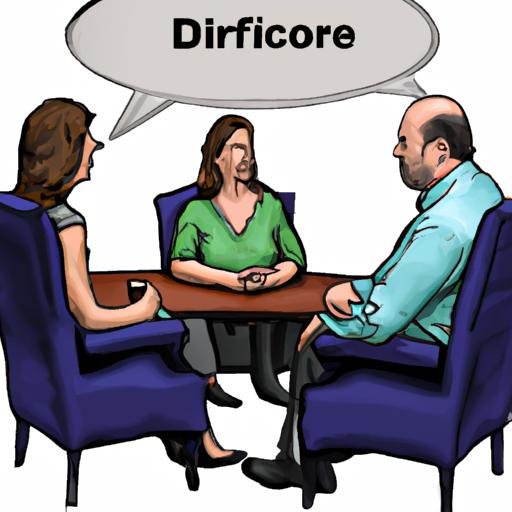
Introduction
In the tumultuous waters of divorce, navigating the murky depths of emotions and legal complexities can be daunting. Two common paths emerge for those seeking to untangle the knot of marriage: mediation and hiring a divorce lawyer. Mediation offers a collaborative approach, fostering communication and cooperation between parties, while divorce lawyers provide legal expertise and representation in court battles. The decision between these two options can significantly impact the outcome of a divorce, making it crucial to choose the right path for resolving conflicts effectively.
When faced with the choice between mediation and hiring a divorce lawyer, understanding the nuances of each option is essential. Mediation promotes open dialogue and negotiation, aiming to reach mutual agreements outside the courtroom. On the other hand, divorce lawyers bring legal knowledge and advocacy to the table, representing individual interests in legal proceedings. Recognizing the differences between these approaches is vital in determining the most suitable path for your unique situation. Ultimately, the decision between mediation and hiring a divorce lawyer can shape the trajectory of your divorce journey, influencing the emotional and financial toll it may take.
Understanding Mediation
Definition of Mediation
Mediation is a voluntary and confidential process in which a neutral third party, known as a mediator, facilitates communication and negotiation between divorcing parties to help them reach mutually acceptable agreements. Unlike traditional divorce litigation, mediation focuses on collaboration and problem-solving rather than adversarial court battles. By fostering open communication and understanding, mediation aims to empower individuals to make informed decisions about their future.
How Mediation Works in the Context of Divorce
In the context of divorce, mediation typically involves both spouses and a trained mediator who guides the process. The mediator helps parties identify key issues, explore possible solutions, and work towards reaching a settlement that addresses the needs and concerns of both parties. Through joint sessions and individual meetings, mediation provides a supportive environment for discussing sensitive matters such as child custody, division of assets, and spousal support. By promoting cooperation and compromise, mediation offers a more amicable and cost-effective alternative to traditional divorce litigation.
Benefits of Choosing Mediation over Traditional Divorce Litigation
Opting for mediation over traditional divorce litigation offers numerous advantages, including faster resolution times, lower costs, and greater control over the outcome. Mediation allows parties to maintain confidentiality and privacy, avoiding public court proceedings. Additionally, the collaborative nature of mediation can help preserve relationships and minimize the emotional toll often associated with contentious divorces. By choosing mediation, individuals can actively participate in crafting solutions that meet their unique needs and priorities, creating a more sustainable and harmonious post-divorce future.
Hiring a Divorce Lawyer
Role of a Divorce Lawyer in the Divorce Process
When it comes to navigating the complex terrain of divorce, a divorce lawyer serves as a guiding compass, providing legal expertise and representation throughout the process. These legal professionals are well-versed in family law, equipping them to handle various aspects of divorce such as child custody, asset division, and spousal support. By enlisting the services of a divorce lawyer, individuals can benefit from tailored legal advice and strategic advocacy to protect their rights and interests during divorce proceedings.
Factors to Consider When Choosing a Divorce Lawyer
Selecting the right divorce lawyer is a critical decision that can significantly impact the outcome of your divorce. Factors to consider when choosing a divorce lawyer include their experience, specialization in family law, track record of success, communication style, and approach to conflict resolution. It is essential to find a lawyer who not only possesses the necessary legal skills but also understands your unique needs and goals, fostering a collaborative and supportive attorney-client relationship.
Pros and Cons of Hiring a Divorce Lawyer
Hiring a divorce lawyer comes with its own set of advantages and drawbacks. On the positive side, a divorce lawyer can provide legal guidance, negotiate on your behalf, and represent you in court, alleviating the burden of navigating the legal system alone. However, the cost of legal representation, potential conflicts of interest, and the adversarial nature of litigation are some of the downsides to consider when opting for a divorce lawyer. Careful evaluation of the pros and cons can help individuals make an informed decision that aligns with their priorities and objectives in the divorce process.
Mediation vs Divorce Lawyer: A Comparison
Cost Comparison
When weighing the financial implications of choosing between mediation and hiring a divorce lawyer, cost plays a significant role in decision-making. Mediation generally tends to be more cost-effective than the traditional route of litigation. With mediation, parties share the cost of a neutral mediator, avoiding the hefty legal fees associated with hiring individual divorce lawyers. In contrast, hiring a divorce lawyer can lead to escalating expenses, particularly if the divorce proceedings become drawn out in court.
Timeframe for Resolution
Time is of the essence when it comes to divorce proceedings, and the timeframe for resolution differs between mediation and litigation. Mediation often offers a quicker path to resolution as parties work together to reach agreements outside the courtroom. Conversely, litigation can prolong the divorce process, subjecting parties to court schedules, legal procedures, and potential delays. Understanding the time commitments involved in each option is crucial in determining the most efficient path towards achieving a divorce settlement.
Control and Decision-Making Power
In the realm of divorce, the level of control and decision-making power can vary significantly between mediation and litigation. Mediation empowers parties to actively participate in crafting agreements that align with their interests and priorities. In contrast, litigation places the decision-making power in the hands of a judge, who ultimately determines the outcome of the divorce. Considering the importance of control and autonomy in divorce proceedings, evaluating the level of influence you desire over the final settlement is essential in choosing between mediation and hiring a divorce lawyer.
Which Option is Right for You?
Factors to Consider when Deciding Between Mediation and Hiring a Divorce Lawyer
In the decision-making process of choosing between mediation and hiring a divorce lawyer, several factors come into play. Consider the level of conflict between you and your spouse, the complexity of your assets, and the willingness to cooperate. Mediation may be more suitable for amicable divorces where both parties are willing to collaborate, while hiring a divorce lawyer may be necessary in high-conflict situations or when complex legal issues are involved. Evaluating these factors can help you determine the most appropriate approach for your specific circumstances.
Personal Preferences and Goals for the Divorce Process
Your personal preferences and goals for the divorce process play a significant role in selecting the right path. Reflect on your desired level of involvement in the decision-making process, the importance of maintaining amicable relationships post-divorce, and the need for privacy and confidentiality. Mediation provides a more hands-on approach, allowing you to actively participate in negotiations and decisions, while hiring a divorce lawyer may offer a sense of security and legal protection. Understanding your priorities and objectives can guide you towards the option that aligns best with your goals.
Case Examples of When Mediation May be More Suitable and When Hiring a Divorce Lawyer May be Necessary
Looking at real-life examples can offer valuable insights into when mediation or hiring a divorce lawyer is the most appropriate choice. In cases where both parties are willing to communicate and compromise, mediation can lead to mutually beneficial agreements and foster positive co-parenting relationships. Conversely, in situations involving abuse, manipulation, or complex legal issues, hiring a divorce lawyer may be necessary to ensure your rights are protected and advocated for in court. Examining these scenarios can help you envision how each option may play out in your own divorce journey.
Conclusion
As we navigate the turbulent waters of divorce, the choice between mediation and hiring a divorce lawyer emerges as a pivotal decision. Mediation offers a collaborative and amicable approach, fostering communication and compromise between parties. On the other hand, hiring a divorce lawyer provides legal expertise and representation in navigating the complexities of the legal system.
In the realm of divorce resolution, there is no one-size-fits-all solution. Each option has its merits and drawbacks, depending on individual circumstances. Whether you opt for the collaborative nature of mediation or the legal representation of a divorce lawyer, the goal remains the same: to find the best resolution for your unique situation. By understanding the differences between mediation and hiring a divorce lawyer, you can make an informed decision that aligns with your goals and values, setting the stage for a smoother transition out of marriage and into a new chapter of your life.


